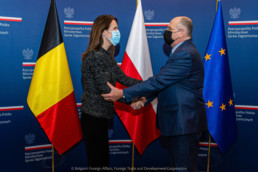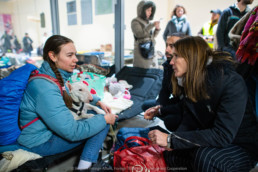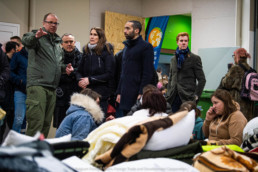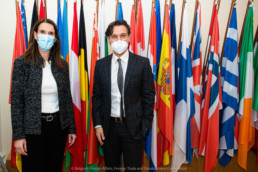On 7 and 8 March 2022, the Deputy Prime Minister and Minister of Foreign Affairs, Sophie Wilmès, accompanied by the Secretary of State for Asylum and Migration, Sammy Mahdi, visited Poland, one of the European countries most exposed to the consequences of the war launched on Ukraine by Russia. This trip was an opportunity to clearly show Belgium’s solidarity with its European partner Poland, which is facing major challenges as it shares a border with Ukraine.
The delegation first visited the border town of Przemyśl. On their arrival, the Deputy Prime Minister and the delegation were received by the mobile consular team permanently deployed on site since 21 February by the Belgian Embassy in Warsaw. The mission of this team is to provide assistance to Belgians wanting to leave Ukraine. Its members therefore organised a meeting with the Deputy Prime Minister and the Secretary of State to inform them of the latest developments in this aspect of the war and explain the day-to-day work they are carrying out on the ground.
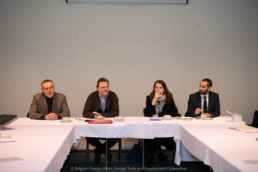
The Deputy Prime Minister and the Secretary of State then visited the border crossing in the town of Medyka, where the Polish authorities gave an update on the situation, including the challenges and obstacles they have faced since the invasion. At the time of the mission, it was estimated that more than 1.5 million Ukrainians had fled the country, more than half of them through Poland. At the time, the United Nations High Commissioner for Refugees predicted up to four million Ukrainian refugees in the short term, which represents a colossal challenge for the European Union and especially for the countries bordering Ukraine. The Deputy Prime Minister was able to see that the vast majority of these refugees are women, accompanied by their child(ren). After visiting the border crossing, the Belgian delegation met the Mayor (Prezydent miasta) of Przemyśl, Mr Wojciech Bakun. Mayor Bakun took them to the “Tesco” site, a former shopping centre reallocated by the local authorities to receive refugees and now used as a transit centre. They were thus able to see for themselves the authorities’ efforts to manage the situation and observe the needs that still need to be met. The Deputy Prime Minister also noted the great solidarity observed on site.
The Belgian delegation arrived in Warsaw on the evening of Monday 7th. A meeting was organised at the Belgian Embassy with representatives of Ukrainian civil society who continue to defend their cause from abroad. They shared with the Deputy Prime Minister their personal experience, the expectations of the Ukrainian civil society regarding the ongoing war and their hopes for the future of their country. During this more than one-hour-long discussion, the Deputy Prime Minister had the opportunity to specify the actions Belgium can take to assist the Ukrainian people; not only through various substantial aids (military equipment, protection, humanitarian aid, reception, etc.), but also by activating certain levers on the international scene to put pressure on the Kremlin in order to obtain an immediate cease-fire and the withdrawal of Russian troops from Ukraine (sanctions, diplomatic isolation of Russia, etc.).
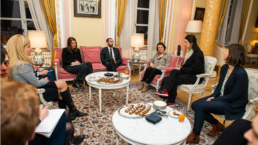
Tuesday 8 March was devoted to several working meetings of a political nature. During the morning, the Deputy Prime Minister met the Director of the European agency, Mr Fabrice Leggeri, and the Director of the OSCE Office for Democratic Institutions and Human Rights (ODIHR), Mr Matteo Mecacci. These meetings allowed a better understanding of the direct consequences of the situation in Ukraine on the European Union and its close vicinity, from the point of view of both the management of external borders (security, migration, etc.) and respect for human rights and fundamental principles. The Deputy Prime Minister also met two representatives of Polish think tanks (Visegrad Insight and the Polish Institute of International Affairs), who shared their geopolitical understanding of the conflict.
The mission ended with a bilateral meeting with the Polish Minister of Foreign Affairs, Mr Zbigniew Rau. In addition to the series of topics previously discussed with other interlocutors, the discussions focused on European cooperation in the face of the conflict in Ukraine, as well as on strengthening NATO’s eastern flank.
